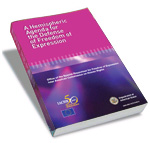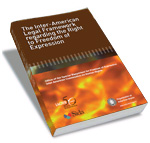Freedom of Expression
Desacato and Criminal Defamation
Basic Principles
Declaration of Principles on Freedom of Expression adopted by the Inter-American Commission on Human Rights in 2000.
“Freedom of Expression and Defense of Honor and Intimacy” by Javier Sierra, Project Director of the Work Committee on Freedom of the Press
Special Meeting of the Permanent Council on the OS regarding the Right to Freedom of Thought and Expression and the Importance of Communications Media. (Only in Spanish)
Date: April 24, 2009
Jurisprudence
Joint Declarations
- Ten Key Challenges for Freedom of Expression in the Next Decade (2010)
- Defamations of Religions, and Anti-Terrorism and Anti-Extremism Legislation (2008)
- Regulation of Communications Media, Restrictions to Journalists, and Investigating Corruption (2003)
- Freedom of Expression and the Administration of Justice, Commercialization and Freedom of Expression, and Criminal Defamation (2002)
- Murders of Journalists and Defamation Laws (2000)
Publications
 A Hemispheric Agenda for the Defense of Freedom of Expression (2009)
A Hemispheric Agenda for the Defense of Freedom of Expression (2009)
This publication, in addition to summarizing the inter-American standards for freedom of expression, recognizes the regional advances achieved in the Americas with respect to the full guarantee of the right to freedom of expression, describes the main difficulties and challenges currently facing the right to freedom of expression in the region, and presents a series of concrete, viable and feasible recommendations that the Office of the Special Rapporteur considers necessary to face these challenges.
 The Inter-American Legal Framework Regarding the Right to Freedom of Expression
The Inter-American Legal Framework Regarding the Right to Freedom of Expression
The objective of this publication is to present inter-American jurisprudence that defines the scope and content of this right in a systematic and updated way. Among the most important topics it highlights: the importance, function, and characteristics of the right to freedom of expression, as well as the types of speech protected; the prohibition of censorship and indirect restrictions; the protection of journalists and social communications media; the exercise of freedom of expression by public officials; and freedom of expression in the area of electoral processes.

